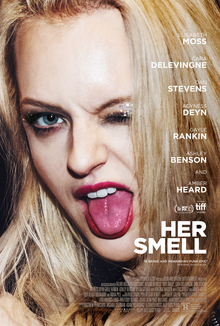While the exploration of the male rock star has been done time and time again (think Velvet Goldmine, Almost Famous, That Thing You Do! and, on the nosely, Rock Star), there are so few fictionalized accounts of the debauched life and times of a female rock star (all we really have is the veracity of the documentary, The Punk Singer, to go on and, to a certain extent, Truth or Dare). Enter Alex Ross Perry (already losing some points on highlighting the subject matter as a result of having a penis) with Her Smell. Starring his longtime muse Elisabeth Moss as Becky Something, the drunken, spitting, rage-filled rocker transitioning into middle-age, the singer has trouble differentiating between her long-cultivated persona and her actual self for the duration of the film. A struggle that results in her increasing the stakes of her self-destructive behavior throughout the often hard-to-watch but also hard-to-look-away-from narrative.
Like a combination of Bikini Kill and Hole, Becky’s band, Something She, reached their peak of fame and success in the early 90s, making the head of their label (Paragon Records), Howard Goodman (Eric Stoltz), both rich-ish and at least mildly self-satisfied with his discovery–a far cry from the worry-wart/reluctant father figure he has become toward Becky of late. After playing a show in an increasingly small venue (for the many cancelled shows thanks to her erratic mood swings make fans increasingly less prone to buying tickets), Becky tears backstage in a whirl of mixed emotions ranging from fury to joy, and all usually at the urging of her “shaman,” Ya-ema (Eka Darville). A shaman who also tells her that her own daughter, Tama (eventually played by Daisy Pugh-Weiss), will be her downfall. Told this in the midst of her ex, Danny (Dan Stevens), showing up to try to get her to spend time with Tama, Becky is too focused on the presence of his new girlfriend, Tiffany (Hannah Gross), and her “energy” to pay much attention. Until she snatches Tama from Danny, runs through the corridor of the backstage area and ends up vomiting as she falls to the ground. So is our introduction to the new Becky Something. The one before the smiling home videos of her and her bandmates, Ali van der Wolff (Gayle Rankin) and Marielle Hell (Agyness Deyn), getting excited over gold records and magazine covers.
Months after her trainwreck blackout backstage, an increasingly alcoholic Becky sings nonsense in the studio, at this point shelling out for the time from her own pocket, convinced she’s working on a masterpiece as Howard struggles to pay his bills as a result of all the wasted money she’s cost him. Ali, who has the least patience for Becky’s bullshit at this point (that can tend to happen when you’ve become someone’s ex-lover), is the first to walk out of the studio, leaving Howard and Mari to deal with Becky’s volatile behavior as Howard angles to bring his new protégées into the space, Akergirls, comprised of Roxy Rotten (Ashley Benson), Crassie Cassie (Cara Delevingne) and Dottie O.Z. (Dylan Gelula). At first, Becky is naturally territorial and aggressive toward the fresh meat, until realizing she can use them to her benefit for recording now that she’s short a drummer. At first, reverential toward their idol, the vibe quickly deteriorates as Mari, too, walks out on the verbally abusive Becky.
Filmed in Perry’s typical manner of no holds barred long takes and tight close-ups, there is no shortage of uncomfortable moments in watching Becky interact with (a.k.a. antagonize) her friends (especially former ones like Zelda, a Marina and the Diamonds-type chanteuse played by Amber Heard) and family, her mother, Ania (Virginia Madsen), included–most especially toward the third act of the film, when Becky’s metamorphosis into the zenith of her rotten to the core persona hits a wall.
A meditation on the often fleeting “muse” that can tend only to come when one is in their youth (particularly in the music industry–ahem, Billie Eilish), Her Smell isn’t so much a cautionary tale as a rumination on the existential crisis that occurs when an artist feels they’ve lost their gift, will never be able to recapture a certain greatness that catapulted them to fame in the first place. This tends to happen, for women and men alike, when they have children–that ultimate emblem of losing one’s edge (except in the case of Madonna, who seemed to become more enraged with the world after “fulfilling her womanly duty”).
And though Perry broaches his subject with the utmost of care, taking his time with a usually rushed character study of the “punk rocker” trope, one feels it would have almost actually been bolder for him to use a male musician as his subject in this instance–for it would be much more novel for a man to suddenly question his entire career and purpose (beyond art) after having a child than it is for women, constantly expected to do so because that is their “natural role.” So sensitive to the pheromones driving their olfactory senses as they are.





















